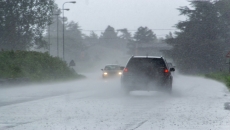Canada will require nutrition warnings on the front of pre-packaged food with high levels of saturated fat, sugar or sodium starting in 2026 in an effort to help grocery shoppers make healthier choices with just a glance.
The policy, more than five years in the making, will clearly label products with the so-called "nutrients of public health concern" that have been linked to conditions such as cardiovascular disease and Type 2 diabetes.
"These regulations are designed to make it easier for us to make informed, healthier choices," Health Minister Jean-Yves Duclos said at a news conference Thursday morning.
Health Canada said the new labels will complement, rather than replace, the more detailed nutrition information that's typically on the back of food packaging.
In general, they'll be placed on pre-packaged foods that contain more than 15 per cent of the suggested daily value of saturated fat, sugars or sodium.
For pre-packaged meals, the warnings will only go on items with more than 30 per cent of the recommended daily intake, and for foods sold in increments of less than 30 grams, the labels will apply if they contain more than 10 per cent of the daily recommendation.
The proposed labels were at the centre of controversy earlier this month when a group of ranchers opposed the government’s plan to include warnings on ground meat.
At the time, the Canadian Cattlemen's Association said the policy would "vilify" ground meat and make people think it's a less healthy choice than whole cuts.
Now, Health Canada has exempted single-ingredient ground meat from the warning labels, even if it's high in fat. The product was deemed to have health benefits in spite of the "nutrients of concern," along with milk, many cheeses and fruit.
"Canadian families rely on ground beef as a nutritious and affordable food staple and an important contributor to food security. We are pleased with Health Canada’s decision to omit ground beef from requiring a misleading warning label," Canadian Cattlemen’s Association President Reg Schellenberg said in a written statement.
Packages of sugar and salt will also be exempt, as the government said including labels on such products would be redundant.
The plan to put warnings on the front of food packages was first floated as part of Health Canada's "healthy eating strategy" in 2016, and consultations continued in 2018.
But Duclos said the government is giving companies until 2026 to implement the change to help them manage the cost of packaging overhauls and potentially reformulate food so they won't be subject to the labels at all.
He said that's one of the program's goals, which came to pass in Chile when that country mandated similar front-of-packaging labels.
A year after implementation, Health Canada said, the proportion of products in Chile required to carry the symbols was significantly reduced, suggesting companies changed their recipes to reduce sugar, fat and salt.
The regulation has seals of approval from the Heart and Stroke Foundation and Diabetes Canada.
Mary L'Abbé, a professor with the University of Toronto's department of nutritional sciences and expert in public health nutrition, said she's also pleased with the policy.
She said a shopper choosing between two spaghetti sauces will now be able to quickly tell if one is considerably healthier than the other and make a choice accordingly.
"We know most consumers don't, in the grocery store, spend the time to turn packages over to compare one nutrition facts table to the other, so it will really help them make those comparisons," she said.
L'Abbé said research shows that after these warnings are added, people are more likely to choose foods lower in sugar, salt and fat.
While it's too soon to say whether it's making a difference in levels of diet-related health conditions, she said, modelling suggests that it will if people continue to make these choices.
"Some products, people will always consume even if they do have warning labels," L'Abbé said, giving the example of processed meat, which is a convenient and cheap option for many.
"I don't think people will change all their food habits, but I think many of the categories where foods will have front-of-pack labels, it will be easy to spot the ones that do (have a warning label) and the ones that don't. And that's the type of change that has been seen in other countries."






